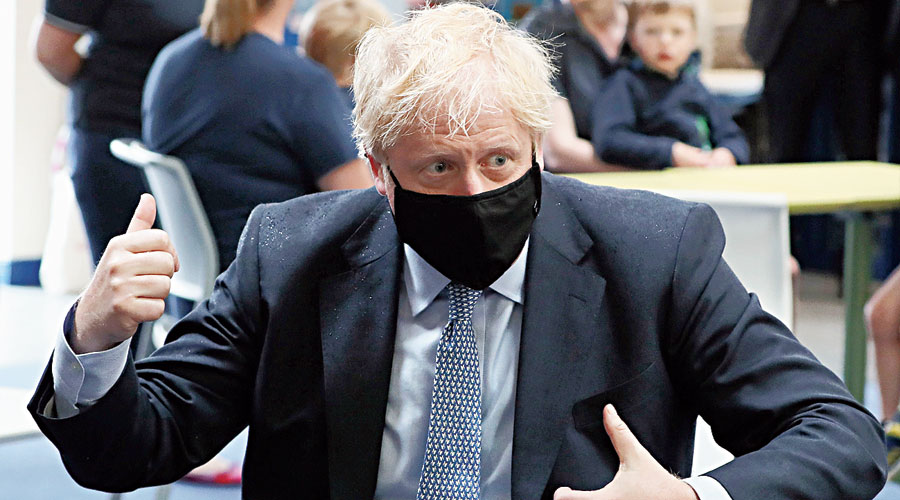Boris Johnson is “on probation”, the BBC said, as the Prime Minister flew to the Ukraine capital of Kiev on Tuesday leaving behind political turmoil at home.
He was supposed to hold talks with Ukraine’s President, Volodymyr Zelensky, and offer UK aid worth £88 million “to promote stable governance and energy independence from Russia”.
His foreign secretary, Liz Truss, could not accompany him as she had hoped to do as she is down with Covid. She was one of several Conservative MPs who attended the packed Commons chamber on Monday without wearing a mask.
There is consensus that Boris’s performance in the Commons on Monday, after publication of a redacted version of Sue Gray’s report on “Partygate”, was not enough to quell the growing rebellion inside the Conservative Party.
Some suggested Britain was becoming a laughing stock overseas because Boris had to postpone a scheduled telephone conversation with Vladimir Putin on Monday because he had to go to the Commons to offer an apology after Gray’s report.
In the evening he met the Conservative parliamentary party in an effort to win over the growing number of MPs who are inclined towards a change of leadership.
The BBC appears to be almost leading the hunt against the Prime Minister.
“Boris Johnson is safe for now, but he of all people knows, it is just for now,” declared Nick Robinson, a presenter on BBC Radio 4’s Today, who was considered a political rival to Boris when they were contemporaries at Oxford.
He revealed: “Last night I joined a pack of political reporters huddled outside a meeting of the Conservative Parliamentary Party in the Attlee Room of the House of Commons. Inside, Tory MPs squeezed together to hear a leader who knew that his future now lies in their hands.
“The first people to leave the meeting were the clearest sign of who’s not convinced — and leading them was the former Prime Minister Theresa May.
“Andrew Bridgen — who has called on the PM to quit — tells me Johnson gave ‘a speech pitched very much if he were a candidate in a leadership election, not the sitting Prime Minister’.”
But other MPs were more supportive of the Prime Minister. However, Boris had to promise that Gray would be asked to submit an updated report after Scotland Yard had completed its investigations into lockdown breaches at 10 Downing Street.
The BBC’s political editor, Laura Kuenssberg, observed: “Many rational MPs seem to have resolved to leave Mr Johnson on probation – break the commitments he made to them and that could quickly change. For now it seems the prime minister has survived the day. Yet in time, his MPs will judge whether just getting through is enough.”
She pointed out: “Remember the process that Tory MPs can use to trigger a contest for their leader is secret, so no-one can be sure how near or far the malcontents are from the threshold of 54 private letters which would press the button on a contest.”
Her assessment is that “Downing Street is not clear of danger. Sue Gray’s findings put this whole mess back under the public’s nose.
How the polls shift in the coming days and weeks will help shape Downing Street’s fortunes, for good or for ill.”
Tuesday’s papers were all critical of Boris’s performance in the Commons on Monday.
The Financial Times, which is often very critical of Narendra Modi, did not spare the British prime minister either.
Its leader, “An indictment of Boris Johnson’s Downing Street”, said that the “Gray report is further proof of prime minister’s unfitness for office”.
The paper, which is generally restrained in its choice of words, appeared to be urging Tory MPs to remove Boris.
“The question for Tory MPs who have first bite at settling Johnson’s future is whether this (the Gray report) is damning enough to remove him,” the paper said. “Part of this will come down to whether he lied to parliament in denying on earlier occasions that rules were broken. His precise words will need to be studied closely but he would certainly appear to have misdirected MPs.”
In dealing with Putin, Britain is taking a tougher line than any other NATO country in Europe. Germany is portrayed in the British media as being positively weak.
The worry for many in Britain – and not just in Tory ranks – is that Putin will not take Boris seriously, aware of his vulnerable position at home.
On Tuesday, Dominic Raab, the former foreign secretary whom Boris demoted to justice secretary but gave him the courtesy title of “deputy prime minister”, sought to defend the prime minister.
He admitted that the standards in Downing Street were “not as they should have been” during Covid-19 lockdowns, in the wake of the Gray report into multiple parties at the heart of government.
Raab said Boris had an “action plan” to remedy some of the organisational failings which, according to the senior civil servant’s report, had contributed to the inappropriate and potentially illegal parties in Number 10.











